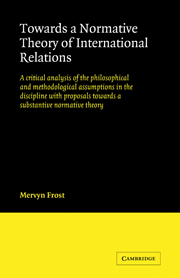 Towards a Normative Theory of International Relations
Towards a Normative Theory of International Relations Conclusion
Published online by Cambridge University Press: 05 March 2012
Summary
I have tried to do two things in this book: first, I sought to examine the reasons for the dearth of normative theory in the discipline of international relations and to show that these reasons for eschewing normative theory are not good ones. Second, I attempted to move towards the construction of a substantive normative theory for international relations. In seeking to achieve this latter objective I followed a model of argument first set out by Ronald Dworkin in the context of legal reasoning. This model of argument starts from the settled norms within a given domain of discourse and seeks on the basis of these to construct a background theory which will enable users to find solutions to hard cases. I started with a list of what most actors in international relations accept as settled norms and then sought to construct a background theory which would enable us to achieve a coherence between the different items on the list of settled goods. In the course of this attempt it was found that the following did not suffice as background theories: order based theories, utilitarian theories and rights based contract theories. The best background theory which emerged was the one I dubbed the constitutive theory of individuality.
In the previous chapter I attempted to apply this background theory to some of the normative problems posed by the uses of unconventional violence in world politics.
- Type
- Chapter
- Information
- Towards a Normative Theory of International RelationsA Critical Analysis of the Philosophical and Methodological Assumptions in the Discipline with Proposals Towards a Substantive Normative Theory, pp. 227 - 229Publisher: Cambridge University PressPrint publication year: 1986
